Imagine you have a wallet in your pocket. It holds your cash, cards, and IDs, right? The cryptocurrency wallet app works exactly the same.
It has your private transaction keys, your ID details, and of course, your digital history. The keys give you access to cryptocurrency, and let you manage your funds, receive, and send them. Having a cryptocurrency wallet app isn’t an option, it’s essential to interact with blockchain spaces.
The best part? Cryptocurrency wallet app comes in different variants. It’s mostly tailored to your requirements and supports different coins.
Whether you’re into Bitcoin, Ethereum, or Litecoin, there’s a wallet available for you. Also, crypto wallets come in two types; Hot wallets, which are online with convenience, and cold wallets which are offline and pretty good with security.
So, let’s discuss these features in detail. We’ve got a detailed breakdown of the best crypto wallet app for you.
Quick Overview
| Wallet | Type | Key Features | |
| Coinbase Wallet | Hot | Beginner-friendly, seamless interface, educational tools, 2FA and biometric login, support 100+ currencies, $255M insurance cover. | Learn more |
| Metamask Wallet | Hot | Ethereum and Web3 focus, DApp browser, cross-chain compatibility. | Visit Metamask |
| Crypto.com Wallet | Hot | DeFi integrations, staking options, CRO rewards, private key control, multi-chain support (Ethereum, BSC), and DApp browser. | Sign-up today |
| Gemini Wallet | Hot | Regulatory compliance (NYDFS), $200M insurance, cold storage, 2FA, and whitelisting features. | Learn more about Gemini |
| Exodus Wallet | Hot | 260+ currencies, better UI, built-in exchange, supports desktop and mobile, automatic blockchain updates. | Try now! |
| Ledger Wallet | Cold | Secure element chip, offline private key storage, supports 5500+ assets, Ledger Live App for DeFi and NFTs. | Visit now |
| Ellipal Wallet | Cold | Air-gapped design, QR code transactions, metal case for durability, support staking, and highly secure offline operations. | Learn more about Ellipal |
| Safepal Wallet | Cold | Budget-friendly, air-gapped design, 10,000+ cryptocurrencies, multi-chain support, DApp browser, staking/swapping options. | Try Safepal! |
| Trezor Wallet | Cold | Open-source software, secure microcontroller, supports 1800+ cryptocurrencies, self-destruct mechanism, PIN, and passphrase protection. | Sign up at Trezor today! |
| KeepKey Wallet | Cold | Simple interface, offline storage, durable design, built-in ShapeShift exchange, and support of major cryptocurrencies. | Learn more |
5 Best Hot Wallets for Easy Acess to Your Crypto
Here’s the list of five hot wallet options for making cryptocurrency much more accessible to you.
1. Coinbase Wallet—Perfect for Newcomers

First up, we have one of the best wallet apps for cryptocurrency, Coinbase Wallet. This application always stands out for beginners since it has a seamlessly designed interface and is pretty easy to use. If you’re unfamiliar with blockchain, this provides you with an entry point to start with.
Coinbase’s interface is very straightforward to understand. There are clear options for sending, receiving, and storing your digital funds. This crypto wallet app also provides educational tutorials to help you navigate the platform quickly. You’ll also find “Coinbase Learn.” It’s an initiative to guide new users, offer blockchain insights, and even provide learning rewards.
Coinbase security is also unmatched. Unlike old wallets, this gives the users control over private keys to safety insurance. In case your funds get damaged, Coinabse has a $255 million insurance cover policy. You won’t even have to go through the traditional passkey hassle since Coinbase has a 2FA and a biometric login system.
However, it’d be an injustice not to discuss its broad compatibility. This wallet application supports hundreds of currencies beyond just Bitcoin and Ethereum, such as Litecoin, Dogecoin, and Cardano. Coinbase also has multiple network support, so beginners will have a one-on-one chance to explore a variety of DeFi projects and NFT marketplaces.
It also has a DApp browser that enables you to access decentralized applications directly, like Uniswap (DeFi platform) and OpenSea (NFT market). It’s indeed a great place to start as a beginner and experience all its blockchain features.
Pros:
- Beginner-friendly, and easy to use.
- Provides backup for private keys.
- Supports a wide range of cryptocurrencies.
Cons:
- Vulnerable to online attacks.
- Not completely decentralized.
2. Metamask Wallet—Best for Ethereum and Web3
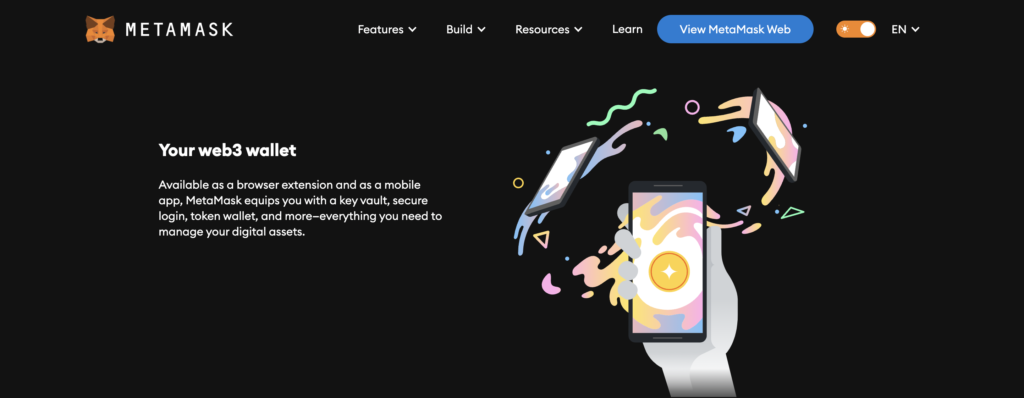
It’s another popular cryptocurrency wallet, highly promoted by users in the Ethereum and Web3 ecosystems. Metamask has a strong connection with Ethereum. This cryptocurrency hosts almost 60% of DApps, which gives Metamask big-time leverage.
This best crypto wallet supports many Ethereum-based tokens, like ERC-20 tokens (like USDC, Chainlink) and ERC-721 tokens (NFTs). It allows the users to store, manage, and interact with their assets directly.
It also has a built-in browser that connects directly to Web3 DApps and provides direct access to Uniswap, Aave, and OpenSea. In 2023, DeFi applications crossed over $50 billion in total value locked (TVL). Thus, Metamask’s easy access facilitation to DeFi and Web3 apps encourages many users to participate in this blockchain system either to earn interest, stake, or mine liquidity.
Metamask crypto wallet security protocols are strict. It doesn’t collect any user data or store them anywhere. This principle aligns with Web3’s motives to reinforce user privacy. Metamask also has another unique security feature. It gives you a 12-word seed phrase, which allows users to recover their wallet if they lose their device.
Although this cryptocurrency wallet app is Ethereum-centric but it’s also compatible with Binance Smart Chain and many interoperable wallets for networks like Avalanche, Optimism, and Fantom. If you want to access your assets from different chains, Metamask readily supports this feature using cross-chain protocols like AnySwap or RenBridge.
Its easy access to Ethereum made it a default wallet option for DApps for those who are fully familiar with Ethereum’s Web3 ecosystem.
Pros:
- Highly compatible with Ethereum and ERC-20 tokens.
- Browser extension and mobile app available.
- Open source platform.
Cons:
- Limited support for non-Ethereum blockchains.
- Hot wallet, susceptible to online theft.
3. Crypto.com DeFi Wallet—Top Choice for DeFi and Staking
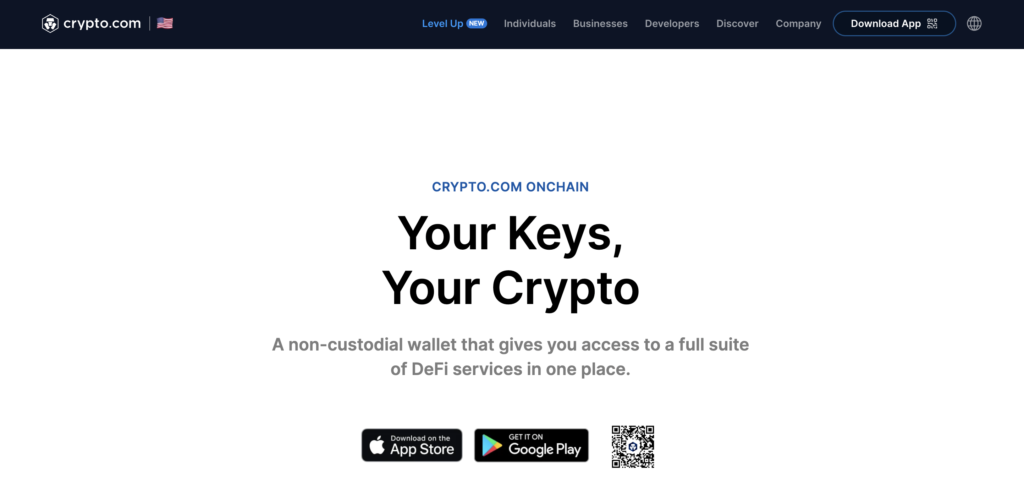
Crypto.com, this one of the best crypto wallets, is a great way to maximize your investments using Staking options and DeFi applications. You’ll have smooth access to the DeFi ecosystem. Unlike custodial wallets, you’ll have full control over your private keys, and none of your data will be stored.
Crypto.com also integrates with different DeFi protocols and decentralized exchanges (DEXs). It allows token swapping and provides high liquidity and rewards. This crypto wallet app is well-known for staking. You can choose from a sea of options with various interest rates, durations, and conditions for a customized earning strategy.
You can also stake its native token, CRO. Its rewards are based on your asset holding, though. Despite this, users can also stake different cryptocurrencies like Polkadot (DOT), Cosmos (ATOM), and Cardano (ADA). This helps you streamline your income strategy as well.
Crypto.com also greatly focuses on security measures for asset control. It has a non-custodial key management system along with seed phrase backup and biometric logins. This crypto wallet application is also well-known for multi-chain support. It’s highly compatible with broad DeFi-friendly chains such as Ethereum, Binance Smart Chain (BSC), and Cronos, Crypto.com’s own blockchain network.
Being the best crypto wallet, this application also has an integrated DApp browser that connects you directly with Compound, Uniswap, and Yearn Finance. This feature is pretty convenient if you are eager to explore DeFi applications.
Pros:
- Earn rewards with staking.
- User-friendly interface.
- Multi-currency support.
Cons:
- High withdrawal fees.
4. Gemini Crypto Wallet—Built for Strong Security
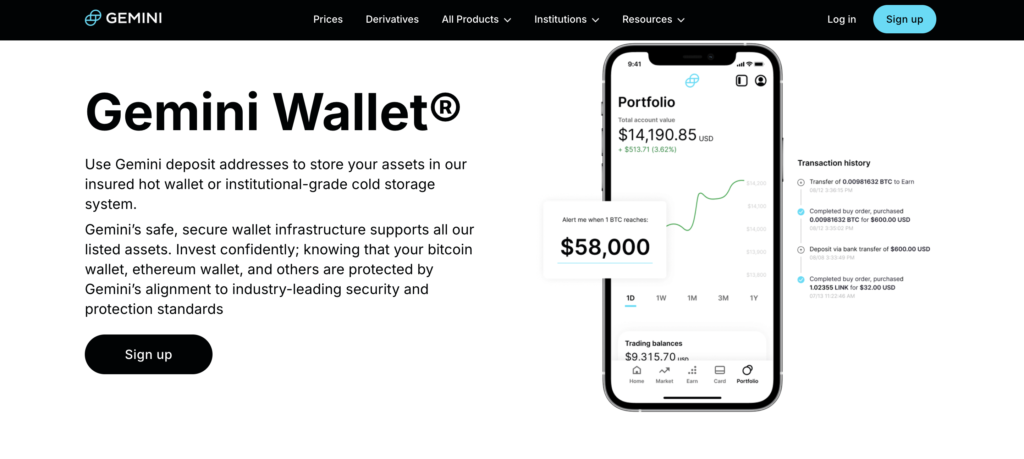
Next up, we have a Gemini cryptocurrency wallet. It’s best for those who prioritize security and prefer regulatory compliance. Gemini is one of the few best crypto wallets that have standard regulatory protocols, and it’s pretty rare in the crypto industry.
It operates under strict financial laws and has been overseen by the New York Department of Financial Services (NYDFS). This ensures the crypto wallet adheres to the security framework and follows the guidelines of KYC and AML protocols for data protection.
All your funds and sensitive data are highly safe with the Gemini crypto wallet. This platform has earned SOC 2 Type 2 certification, an industry-standard recognition for companies handling large sets of sensitive data.
The best part? Gemini doesn’t hesitate to provide $200 million in insurance funds to its users in case funds are damaged, and this adds an extra layer of security. The majority of the assets are stored in cold storage to prevent online theft and hacking.
This crypto wallet has been helping 13 million users worldwide and has rightly established itself as one of the safest cryptocurrency wallet applications. It has further security features too, like device whitelisting. This enables the users to restrict account access to specific devices. You’ll also find a 2FA system, biometric authentication, and withdrawal address whitelisting security operations.
Pros:
- Highly secure and regulated.
- Recovery funds for assets.
Cons:
- Limited advanced features for DeFi and staking,
5. Exodus—Easy Interface with Wide Coin Support

Exodus is rightly known for being the best crypto wallet available today. It’s simply very convenient and has made the storing of transaction keys much easier. Exodus has the most visually appealing interface that lets you see your portfolio with ease.
There are no advanced UI elements so you don’t need a technical degree to learn how this crypto wallet works. You can easily send, receive, and manage your transactions easily. Also, this site isn’t just desktop-compatible. You can use all the features in mobile mode as well. This feature is pretty helpful if you want to connect with your wallet on the go.
Exodus, being one of the best cryptocurrency wallet applications, also has a wide array of coins. It supports over 260 currencies with majors like Bitcoin, Ethereum, Litecoin, etc. It has even extended to popular DeFi and NFT tokens.
One of the most commendable features is that Exodus doesn’t need manual updates. It automatically monitors blockchain platforms and adds new coins. This cryptocurrency wallet app is said to add 5-10 new tokens per month, a pretty good average, right?
Exodus also has a built-in crypto exchange that allows you to trade directly. It just doesn’t swap between limited tokens instead supports exchanges for hundreds of coins, providing a convenient way for you to diversify your portfolios.
Pros:
- User-friendly interface with beautiful design.
- Multi-currency support.
- Compatible with Trezor hardware wallets.
Cons:
- No 2FA.
- High transaction fees.
5 Best Crypto Wallets for Secure Offline Crypto Storage
Following are the well-known cryptocurrency wallets that support secured fund storage offline.
1. Ledger Crypto Wallet – Trusted Choice for Secure Cold Storage
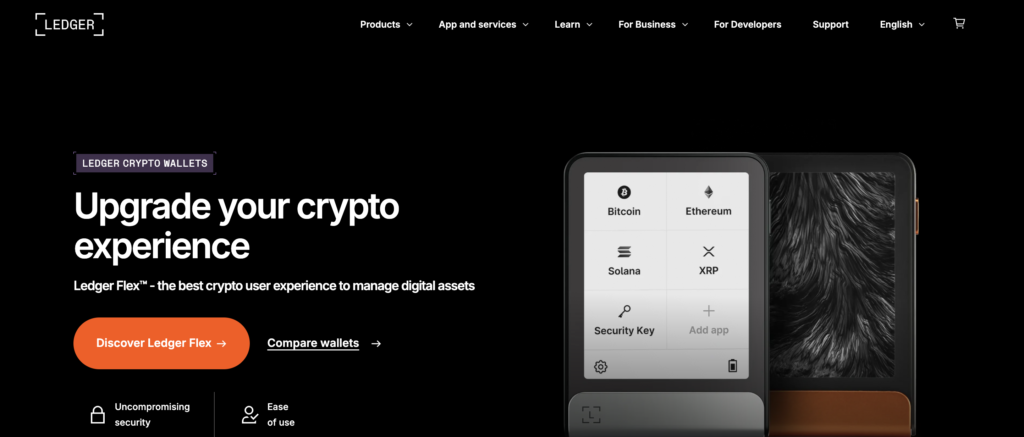
First up, we have the Ledger cryptocurrency wallet app. It’s best known for being one of the most secure hardware wallets in the market. Though, this crypto wallet app launched in 2014 but its expansion is pretty insane.
It’s not just one product making waves in the market but Ledger’s flagship products like Ledger Nano S and Ledger Nano X are also very popular in the crypto wallet industry.
It has also collaborated with big names like Coinbase, Binance, and FTX for further enhancement of functionalities and services. Despite the reputation, one thing that sets Ledger apart is its security operations.
Being one of the best cryptocurrency hardware wallets, it’s built with a highly safe microprocessor “Secure element (SE) chip” also used on credit cards and passports to protect sensitive data.
The ledger cryptocurrency wallet app works on a proprietary operating system called BOLOS (Blockchain Open Ledger Operating System). This OS prevents false interaction with risky applications to prevent security risks. All the private keys are stored offline for no exposure to the internet. This is best for long-term holders and large-volume traders.
The ledger cryptocurrency wallet app also supports over 5,500+ currencies. This platform is also highly compatible with DeFi (decentralized finance) platforms and NFTs (non-fungible tokens). It has a Ledger live App to manage your DeFi applications.
Another good feature is the recovery funds. If your funds get damaged somehow, Ledger takes the full charge. It has a subscription-based service for recovering your keys if they’re lost.
Pros:
- Cold storage, providing high-level security against hacks.
- Supports over 5,500 cryptocurrencies and tokens.
- Compact and portable.
Cons:
- Requires physical access for transactions.
- High initial cost.
2. Ellipal Crypto Wallet—Completely Offline for Enhanced Security

Next up, we have the Ellipal cryptocurrency wallet that’s quite popular in the crypto industry owing to its air-grapped design and convenient features. It’s a hardware wallet thus the security standards are very rigorous.
This one of the best crypto wallets operates fully offline and has no internet exposure. The air-grapped design basically cuts down all the online vulnerabilities and makes it stand against cyber attacks and hacking attempts.
The best part is the Ellipal crypto wallet doesn’t have any hardwired storage. It uses QR codes instead to encode the transaction keys, ensuring the transmission of data remains transparent.
This crypto wallet has a robust exterior design. It has a solid metal case designed that provides strong resistance against water damage and fire. You’ll also find a broad range of cryptocurrencies available on this platform.
You can even do staking and manage your swap your assets directly with integrations for decentralized apps and features like staking for ADA, ATOM, and DOT. It’s indeed a good choice who prefer fund security and holding assets for a long time.
Pros:
- Completely air-gapped.
- Supports a wide range of cryptocurrencies.
- Large touch screen.
Cons:
- Expensive compared to other wallets.
- Bulkier.
3. Safepal Wallet – Budget-Friendly Hardware with Solid Protection
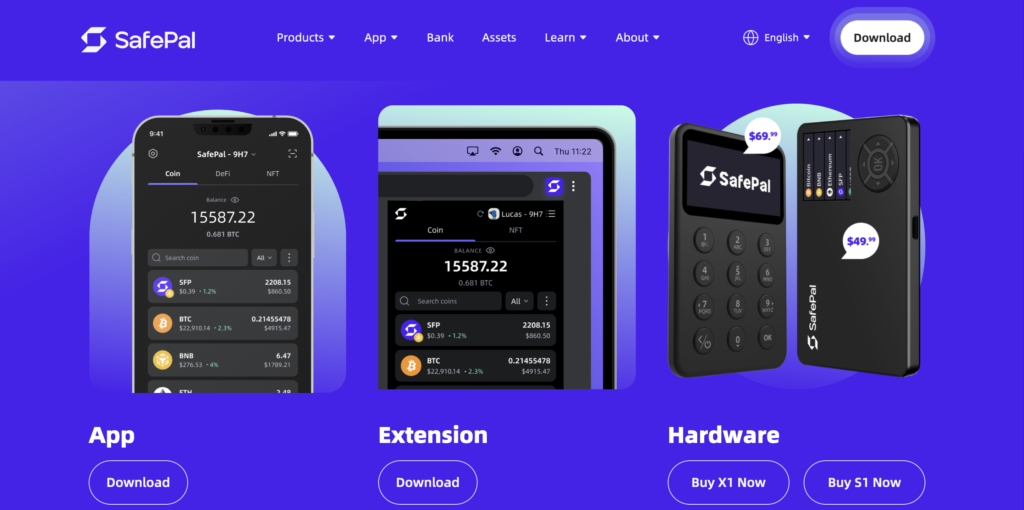
Launched in 2018 with 10 million users globally, the Safepal cryptocurrency wallet app has its own perks and acknowledgment in the industry. It’s among one of the best wallets with a reasonable price structure and that too without any compromise on quality. You can easily find it at a retail price of $50, unlike other hardware wallets like Ledger or Trezor priced around $100.
The best part is this cryptocurrency is equally strict with security despite its affordability factor. It uses an air-grapped design which simply means this crypto wallet is far from online access and doesn’t use any USB, Bluetooth, WiFi connections, etc.
Once your transaction proceeds successfully, this site uses a self-destruct mechanism that wipes out all your stored data. It also has a secure element chip that provides robust encryption security to protect your private keys.
Safepal’s design is even compact. This cryptocurrency wallet features a 1.3-inch high-resolution screen for easy viewing and transaction confirmation. It also has a D-pad for easy navigation which keeps the user experience straightforward and approachable for all.
This wallet supports almost 10,000+ cryptocurrencies and over 30 blockchains. You can also interact with DApps, the DeFi platform, and NFTs using Safepal. It also has functionalities like swapping, staking, and managing your assets directly.
Using this crypto wallet, you can easily participate in DeFi, trade, and store assets across multiple blockchains securely.
Pros:
- Budget-friendly pricing.
- Highly secured.
- User-friendly design.
- Supports a wide range of cryptocurrencies.
Cons:
- Limited customer support.
- No Bluetooth or USB support can be conveniently limited for some users.
4. Trezor Wallet – Robust Protection for Your Crypto

Trezor wallet was launched in 2014 and it’s among one of the few hardware crypto wallets designed specifically for securing your transactions offline. It’s an open-source software with high-level security features.
There are two variants of Trezor available; Trezor Model One and Trezor Model T. Both of them come with strong security protocols. This cryptocurrency wallet doesn’t use integrated securing chips instead you’ll find a secured microcontroller that keeps your data encrypted.
Trezor crypto wallet also has a self-destruct mechanism that automatically wipes out your stored data to prevent online theft. This crypto wallet also gives you big-time leverage to test, inspect, and enhance the code if you want to ensure your wallet’s security yourself.
The interface is also pretty simple. You’ll find easy navigation features and can use this wallet on desktop and mobile as well. Trezor supports more than 1800+ cryptocurrencies including Bitcoin, Ethereum, and ERC-20 tokens which makes it highly versatile for diverse crypto portfolios.
Pros:
- Top security with PIN, 2FA, and passphrase features.
- Open source software.
- Better UI.
Cons:
- High price.
- No Bluetooth support.
5. KeepKey Wallet—Simple and Secure Hardware Storage

Lastly, we have the KeepKey wallet, and safe to say, it’s one of the most convenient crypto wallets to exist. Launched in 2015 by Darin Stanchfield and quickly got recognition for its focus on security and simplicity. If you’re new to hardware wallets, KeepKey can be your go-to choice.
It has a premium metal case exterior with a large OLED display. Keepkey’s screen display lets you navigate your crypto details all the time so you’ll be aware of your transaction history. This crypto wallet application has a cold storage system so your private keys are stored offline.
KeepKey also has expanded and now supports a range of currencies like Bitcoin, Ethereum, Litecoin, Dogecoin, Dash, and ERC-20 tokens. This platform is also robust with security. Users get a 12, 18, or 24-word recovery phrase that ensures secure recovery in case your funds are damaged.
Pros:
- Beginner-friendly platform.
- Large screen display transaction.
- Robust design.
Cons:
- Slow version updates.
- No wireless connectivity.
- Limited currency support.
Types of Cryptocurrency Wallet Apps

Here are some of the popular types of crypto wallet applications.
1. Hot Wallets
First up, we have hot wallets on our list. It’s online and pretty convenient to use but isn’t too strict against security. Hot wallets are software-based so it’s a good option for those who always want quick access to their crypto transactions. You won’t have a hard time setting it up.
It’s convenient to use and readily accessible through desktop and mobile devices. Hot wallets are best for making daily quick transactions. However, due to continuous internet exposure, they’re vulnerable to cyber-attacks and can potentially face security breaches.
For example, Coinbase Wallet, Crypto.com, and Metamask are famous hot wallets in the crypto industry. They’re flexible to use, have a broad range of currencies, and are connected to major blockchain networks like Ethereum, Binance space chain, etc.
2. Cold Wallets
It’s an offline storage wallet with advanced security protocols. The cold wallets are much more secure against hacking and all kinds of cyber attacks. It’s highly recommended for long-term investors and high-volume traders who hold assets for a long time and of course, can’t overlook security measures.
For instance, if you’re planning on holding crypto or any other coin for a year without frequent transactions, cold wallets will be your best partner. It offers you peace of mind with much-enhanced security protocols.
However, cold wallets come in two types. Let’s see them too.
A. Hardware Wallets
It’s a physical device like a USB to store your transaction keys. You’ll have to connect it to your PC only when making transactions. It’s very convenient. You can physically hold your wallet and keep it anywhere you want as long as it’s accessible.
Hardware wallets have become one of the most trusted ways to secure cryptocurrencies. For example, Ledger Nano X, Trezor Model T, etc are very popular cryptocurrency wallets. They are versatile, strictly secured, and trusted globally.
If you’re new to this industry, hardware wallets can be your go-to choice if you don’t require often transactions and want to hold multiple currencies for a long time.
B. Paper Wallets
This type is different but quite popular among investors. Paper wallets involve printing out the crypto keys on paper. No, they won’t be written as normal passkeys instead represented as QR codes that can be scanned to make a transaction.
This cryptocurrency wallet is entirely offline and thus has a very high level of security from cyber crimes. The best part is paper wallets are much cost cost-effective. You don’t need any device to store the keys, unlike a hardware wallet, which saves you money.
However, one drawback is they’re vulnerable to physical damage. Paper wallets can be damaged by water, or fire, or can get lost or stolen. So, you need to be mindful of this factor only.
Conclusion
Wrapping up what we discussed above, it can be safely concluded that having the right cryptocurrency wallet app is quite crucial for your investment. If you neglect any requirement, you might end up having the wrong one that won’t suit your digital assets holding.
As a beginner, we highly recommend that you go for the Coinbase wallet. If someone loves experimenting with DeFi applications, Crypto.com can help you, and if you’re looking for maximum security protection Ledger and Trezor will be the best choice.
Also, wherever you’re opting for a wallet, make sure you consider usability, security, and compatibility to make an informed decision.






